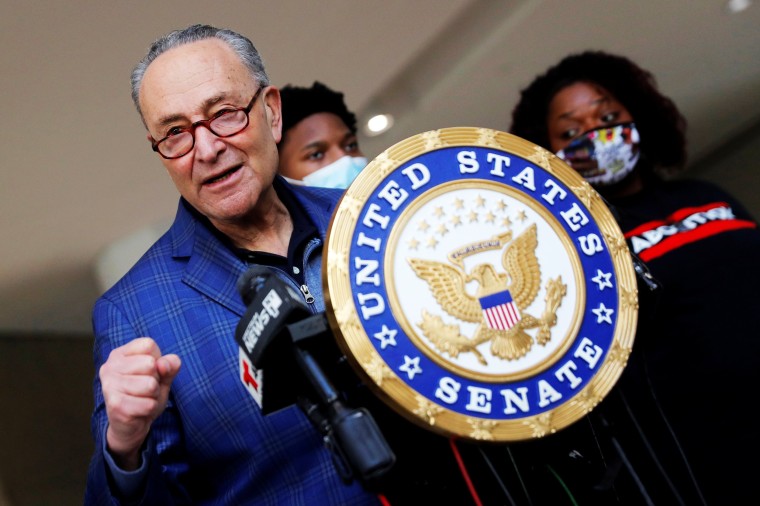When Senate Majority Leader Chuck Schumer (D-N.Y.) sat down with Rachel two months ago, he made a comment, almost in passing, about part of his legislative strategy for the year.
Pointing to the procedure known as the budget reconciliation process -- a complicated tactic that allows a Senate majority to circumvent filibusters on certain kinds of bills -- the Democratic leader noted that he and his party "get two reconciliation motions," one of which he'd use to pass a COVID relief package, while using the other to pass a jobs and infrastructure plan.
The explanation for this gets a little complicated. Ordinarily, the majority would only get to use the tactic once per year -- it's tied to the annual budget resolution -- but because there was no budget resolution adopted in 2020, Schumer effectively gets two bites at the apple. It's precisely why the odds of the White House's infrastructure plan passing are pretty good, whether Republicans like it or not.
But as it turns out, the Senate majority leader apparently has an idea about a possible third bite at the apple. Politico reported this morning Schumer and his team believe they've found "a magical parliamentary trick" buried in the rules of the Congressional Budget Act that "Democrats could use to unlock a third reconciliation bill this year." The report added that it's called Section 304, "and you're about to start hearing about it a lot."
This section of the law that governs the congressional budgeting process essentially says that Congress may revisit and amend an already-passed budget resolution, like the one used to pass the Covid relief package. Or at least that's what Schumer aides are arguing. "Recently, top policy aides to Majority Leader Schumer made the argument to the Senate Parliamentarian that Section 304 allows for at least one additional set of reconciliation bills related to revenue, spending and the public debt to be considered for Fiscal Year 2021," a Schumer aide previewing the strategy told us Sunday night.
Not surprisingly, this has sparked a fair amount of chatter among Capitol Hill watchers: there were related reports this morning from Axios, the Washington Post, and Punchbowl News, among others.
I'd love to be able to tell you in detail whether Schumer's gambit has merit, but I'll confess that I'd never heard of Section 304 of the Congressional Budget Act until a few hours ago, and there's no precedent for this provision of the law being used this way.
That said, that's hardly the only relevant question. Will the Senate parliamentarian go along with Schumer's interpretation of the law? Will Sen. Joe Manchin (D-W.Va.) accept a third reconciliation attempt? What would Democrats apply reconciliation to if they're permitted to use it a third time? If revisiting an earlier budget resolution generates a fresh legislative opportunity, couldn't Schumer theoretically seek a fourth bite at the apple, too? And a fifth? And a sixth?
For now, none of these questions have answers and we'll have to wait for additional clarity.
But it's worth stepping back to appreciate the bigger picture: Schumer is eager to govern and pass meaningful legislation, but he realizes that a radicalized Senate Republican conference will filibuster everything. The odds of 10 GOP senators breaking ranks on any major legislation are effectively zero.
Unwilling to accept the idea that his legislative agenda for this Congress is already dead, the majority leader is scrambling to come up with provocative interpretations of obscure budget rules, all in the hopes that he'll be able to pass some worthwhile bills.
I don't blame Schumer in the slightest, but the fact that such convoluted efforts are even required is emblematic of the fact that the modern Senate does not work, and its procedures are in need of a dramatic overhaul.
